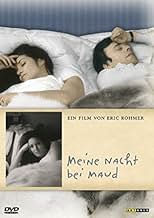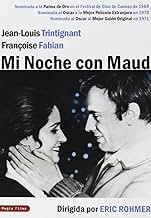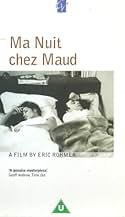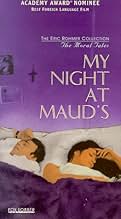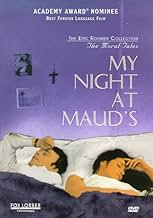Os princípios rígidos de um católico devoto são desafiados durante uma estadia de uma noite com Maud, uma mulher divorciada com uma enorme personalidade.Os princípios rígidos de um católico devoto são desafiados durante uma estadia de uma noite com Maud, uma mulher divorciada com uma enorme personalidade.Os princípios rígidos de um católico devoto são desafiados durante uma estadia de uma noite com Maud, uma mulher divorciada com uma enorme personalidade.
- Direção
- Roteirista
- Artistas
- Indicado a 2 Oscars
- 6 vitórias e 6 indicações no total
Avaliações em destaque
These are among the reasons, I think, for the freshness of the movie. Because the way people talk, cherish their own opinions and express emotions is something which still happens today in human relationships! The film contains exactly situations of the ordinary life -you don't see that movie and think "It's only a film!".
Good performance -as always- of Jean-Louis Trintignant and superb black and white cinematography by Nestor Almendros.
There is a refreshing lightness and maturity to the way in which these characters (and perhaps the French in general) treat love affairs. They are spoken of as anything else in life, there is understanding when someone wants to move on, and when a woman says 'no', it's respected, without further pursuit. Vidal leaves Jean-Louis alone with Maud for the night, knowing there is an attraction between the two, and it's interesting to listen to them talk about their views while she lightly flirts with him. In his view, she has two strikes against her - one physical (she's not a blonde, his preference), and one spiritual (she's not a Catholic). On the other hand, it's because there seems to be no chance of a relationship that they seem so happy and natural together. Their scene later in the snow is fantastic. Unfortunately, he's already become attached to another woman he's seen in church (Marie-Christine Barrault), who, while blonde and Catholic, seems less interesting and less sensuous, setting up an interesting choice for him.
It's telling to me that despite his earnestness and apparent honesty, he tells each of them early on that he feels he's known her for ages. There is something devastatingly honest about hearing that, as we no doubt repeat ourselves in different relationships, and it can be read as being disingenuous, or as commentary that we can connect with many different people in life, and tend to do so, so that our final partner is somewhat arbitrary, even if influenced by certain principles.
While parts of the film were slow and I wish the philosophical discussions hadn't been so specific to Pascal and Jansenism, I liked the intelligent, meaningful conversations these characters have. I also liked the street footage in the wintertime, during the Christmas holidays, which is clearly real and adds to the film's aesthetic. Françoise Fabian lights up the screen in her scenes, and plays the most interesting character, one I empathized with (divorced, single mom) and related to (more down to earth, and what I would call a spiritual atheist). The ending scene makes us both wistful and accepting at the same time. It's not a perfect film, or even one I would recommend without at least some reservations, but at the end I found I had liked it.
Eric Rohmer's film is full of dialogue. The characters talk and talk, often so intellectually that I had trouble keeping up. But the talk is interesting and intriguing. The main theme (it appeared to me, anyway) is the value of faith in a world where the likelihood of heaven is becoming increasingly unlikely. Jean-Louis, a former ladies man, fights his urges when Maud invites him into her bed. He eventually climbs in, feeling the cold, and begins to kiss her. He eventually pulls away, looking almost angry with himself. He obviously feels that an eternity in heaven, however unlikely the idea is, is worth more than a moment of weakness and happiness.
The dialogue-heavy scenes may not appeal to everyone, it can at times be difficult to engage with the film and bourgeois characters. But it is richly rewarding and a highly intelligent character study. The film has an almost love/hate attitude to the idea of Christianity in a similar way to many of Bergman's greatest films. One of the most intellectually stimulating films of the French New Wave movement.
www.the-wrath-of-blog.blogspot.com
This is the Eric Romer film they warned you about. There is a lot of talk, talk, and more talk. But the talk is very interesting. One of the main topics of discussion is Pascal's famous wager. Pascal believed that if there is even the slightest chance of the Christian heaven being true, then as a matter of probability, one ought to be a believer. Even a minuscule chance of everlasting paradise is worth the bet because infinity (eternity) times even a very small number is infinity. And, of course, if not believing puts one in however small the danger of eternal damnation, then again one should be a believer. But, as Vidal (Antoine Vitez) sagely remarks in the movie, infinity times zero is still zero.
Jean-Louis Trintignant stars as a 34-year-old Catholic mathematician who has a way with women. He runs into his old school chum, Vidal, who introduces him to Maud (Francoise Fabian), who has a way with men. Funny but they don't quite hit it off even though she manipulates him into spending the night with her. Their conversation is witty, subliminal and revealing. Maud believes in the supremacy of love, Jean-Louis in being morally flexible. Although a believing and practicing Catholic, he tells Maud that one is not going against God's will by chasing girls anymore than one is going against God's will by doing mathematics.
The girl that Jean-Louis is currently chasing is 22-year-old Francoise (Maire-Christine Barrault) a blonde, Catholic girl that he has spied at church. At first it seems that although he is certain that she is perfect for him, she is reluctant. They too fence with words as they try to mislead and reveal at the same time, and the audience is intrigued, so much so that at times you might forget you are watching a movie. In this sense a Romer film is like a stage play. Whereas contemporary directors try to get by with as little dialogue as possible, to let the action itself reveal character, Romer is not shy about using dialogue to reveal character, plot, theme--the whole works.
The film begins with a long close shot of Francoise's profile as she listens in church, turning twice briefly to face the camera. She is pretty and intriguing. Although we won't realize it until the movie is mostly over, she is the focal point of the balance between the world views of Jean-Louis and Maud. After the night at Maud's during which Maud uses her intuition and sly intelligence to figure out Jean-Louis's character, he spends the night with Francoise. She uses her instincts to figure out not his character so much as his aptness for her. And then it is revealed how Francoise figures twice in the life of Maud. I won't anticipate the revelation, but be sure and watch for it. Suffice it to say that there are two reasons that Francoise is far from Maud's favorite person! The film ends, as French films often do, with the ironic affirmation of bourgeois values.
For today's DVD hound this movie will play slowly or not at all. The use of dialogue as something over and above the plot and action of the film will seem demanding and perhaps old fashioned. The deliberately drawn out scenes at church may cause you to yawn. But I recommend you stay with it. The movie has a quality that lingers long after the action is gone. The underlying philosophy about the nature of human love and how it conflicts or is compatible with reason and/or religion really does reflect to some extent the quotation above from Pascal, whose spirit is akin, although he denies it, to that of Jean-Louis, the careful protagonist of this very interesting film.
(Note: Over 500 of my movie reviews are now available in my book "Cut to the Chaise Lounge or I Can't Believe I Swallowed the Remote!" Get it at Amazon!)
Você sabia?
- CuriosidadesJean-Louis Trintignant's character is never called by name in the entire film. He is shown in credits as "Jean-Louis."
- Erros de gravaçãoWhen Jean-Louis Trintignant accepts to climb into bed with Françoise Fabian, he motions for her to pass him the blanket, extending his right hand holding a lit cigarette. The next shot from the side shows him grasping the blanket with a cigarette-free right hand.
- Citações
Jean-Louis: Are you still a Marxist?
Vidal: Absolutely. For a Communist, Pascal's wager is very relevant today. Personally, I very much doubt that history has any meaning. Yet I wager that it has, so I'm in a Pascalian situation. Hypothesis A: Society and politics are meaningless. Hypothesis B: History has meaning. I'm not at all sure B is more likely to be true than A. More likely the reverse. Let's even suppose B has a 10% chance of being true and A has 80%. Nevertheless I have no choice but to opt for B, because only the hypothesis that history has meaning allows me to go on living. Suppose I bet on A, and B was true, despite the lesser odds. I'd have thrown away my life. So I must choose B to justify my life and actions. There's an 80% chance I'm wrong but that doesn't matter.
Jean-Louis: Mathematical hope. Potential gain divided by probability. With your hypothesis B, though the probability is slight, the possible gain is infinite. In your case, a meaning to life. In Pascal's, eternal salvation.
Vidal: It was Gorky, Lenin or maybe Mayakovsky who said about the Russian revolution that the situation forced them to choose the one chance in a thousand. Because hope became infinitely greater if you took that chance than if you didn't take it.
- ConexõesFeatured in The 82nd Annual Academy Awards (2010)
Principais escolhas
Detalhes
- Data de lançamento
- País de origem
- Central de atendimento oficial
- Idioma
- Também conhecido como
- My Night at Maud's
- Locações de filme
- Empresas de produção
- Consulte mais créditos da empresa na IMDbPro
Bilheteria
- Faturamento bruto mundial
- US$ 11.088
- Tempo de duração1 hora 50 minutos
- Cor
- Mixagem de som
- Proporção
- 1.33 : 1
Contribua para esta página



